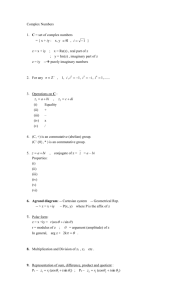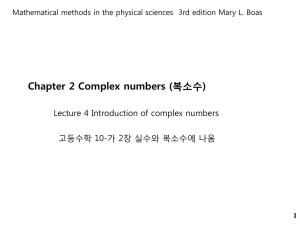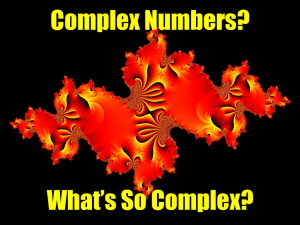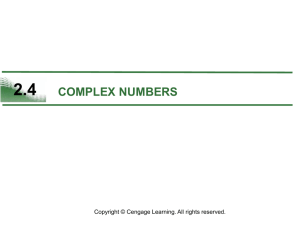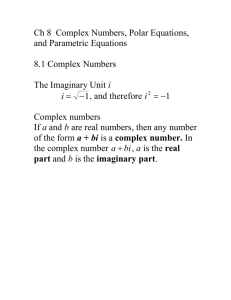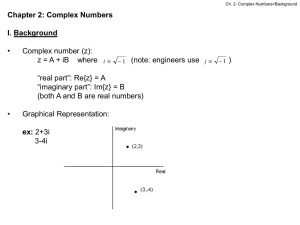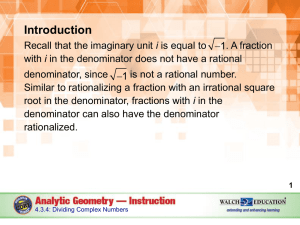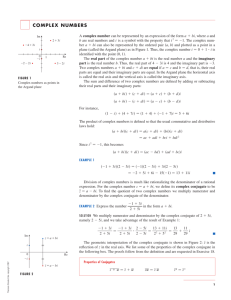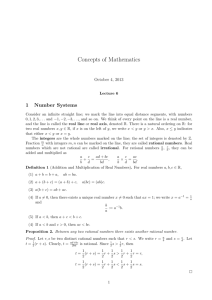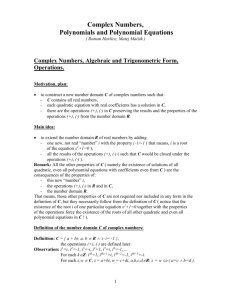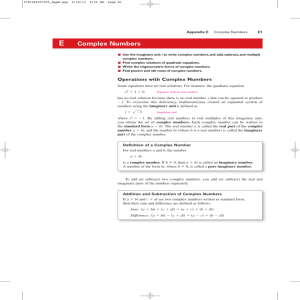Lecture 1
advertisement
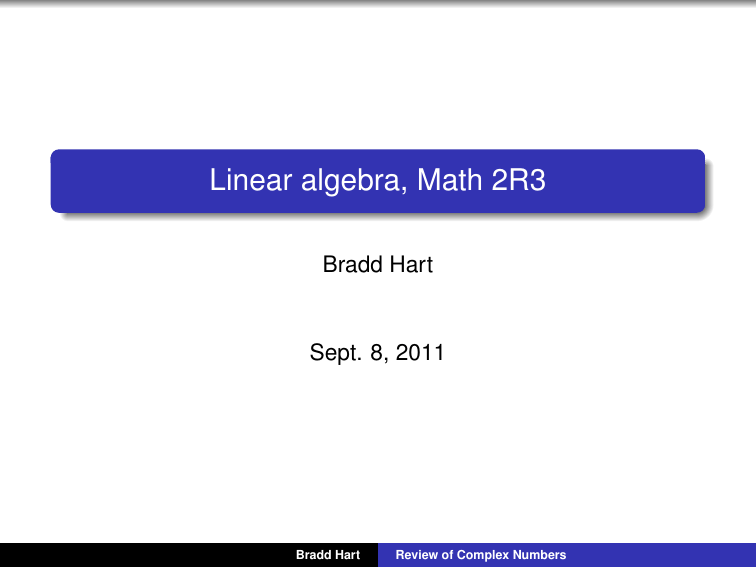
Linear algebra, Math 2R3 Bradd Hart Sept. 8, 2011 logo Bradd Hart Review of Complex Numbers Short-term outline Review of complex numbers, sections 10.1 - 10.3 Review of real vector spaces, sections 5.1 - 5.4 Introduce complex vector spaces, section 10.4 logo Bradd Hart Review of Complex Numbers The complex numbers logo Bradd Hart Review of Complex Numbers The complex numbers Introduce a new quantity, i, such that i 2 = −1. logo Bradd Hart Review of Complex Numbers The complex numbers Introduce a new quantity, i, such that i 2 = −1. The complex numbers are then all expressions of the form a + bi where a and b are real numbers. logo Bradd Hart Review of Complex Numbers The complex numbers Introduce a new quantity, i, such that i 2 = −1. The complex numbers are then all expressions of the form a + bi where a and b are real numbers. Operations on the complex numbers logo Bradd Hart Review of Complex Numbers The complex numbers Introduce a new quantity, i, such that i 2 = −1. The complex numbers are then all expressions of the form a + bi where a and b are real numbers. Operations on the complex numbers Addition: (a + bi) + (c + di) = (a + c) + (b + d)i logo Bradd Hart Review of Complex Numbers The complex numbers Introduce a new quantity, i, such that i 2 = −1. The complex numbers are then all expressions of the form a + bi where a and b are real numbers. Operations on the complex numbers Addition: (a + bi) + (c + di) = (a + c) + (b + d)i Multiplication: (a + bi) · (c + di) = (ac − bd) + (ad + bc)i logo Bradd Hart Review of Complex Numbers Multiplicative inverse Every non-zero complex number has a multiplicative inverse. That is, if z1 is not zero then the equation, in the unknown z, z1 z = 1 has a solution. logo Bradd Hart Review of Complex Numbers Multiplicative inverse Every non-zero complex number has a multiplicative inverse. That is, if z1 is not zero then the equation, in the unknown z, z1 z = 1 has a solution. The conjugate logo Bradd Hart Review of Complex Numbers Multiplicative inverse Every non-zero complex number has a multiplicative inverse. That is, if z1 is not zero then the equation, in the unknown z, z1 z = 1 has a solution. The conjugate If z = a + bi then z̄, the conjugate of z, is a − bi. logo Bradd Hart Review of Complex Numbers Multiplicative inverse Every non-zero complex number has a multiplicative inverse. That is, if z1 is not zero then the equation, in the unknown z, z1 z = 1 has a solution. The conjugate If z = a + bi then z̄, the conjugate of z, is a − bi. Notice that z z̄ = a2 + b2 so logo Bradd Hart Review of Complex Numbers Multiplicative inverse Every non-zero complex number has a multiplicative inverse. That is, if z1 is not zero then the equation, in the unknown z, z1 z = 1 has a solution. The conjugate If z = a + bi then z̄, the conjugate of z, is a − bi. Notice that z z̄ = a2 + b2 so z̄ 1 = z z z̄ logo Bradd Hart Review of Complex Numbers The complex plane y 6 r(a, b) r θ - x logo Bradd Hart Review of Complex Numbers The complex plane y 6 r(a, b) r θ - x √ r = a2 + b2 ; this is called the modulus of the complex number z = a + bi and written |z|. logo Bradd Hart Review of Complex Numbers The complex plane y 6 r(a, b) r θ - x √ r = a2 + b2 ; this is called the modulus of the complex number z = a + bi and written |z|. We saw that z · z̄ = |z|2 . logo Bradd Hart Review of Complex Numbers The complex plane y 6 r(a, b) r θ - x √ r = a2 + b2 ; this is called the modulus of the complex number z = a + bi and written |z|. We saw that z · z̄ = |z|2 . θ is an argument for a + bi and is only determined up to multiples of 2π. logo Bradd Hart Review of Complex Numbers The complex plane y 6 r(a, b) r θ - x √ r = a2 + b2 ; this is called the modulus of the complex number z = a + bi and written |z|. We saw that z · z̄ = |z|2 . θ is an argument for a + bi and is only determined up to multiples of 2π. a = r cos(θ) and b = r sin(θ) so z = r (cos(θ) + i sin(θ)). Bradd Hart Review of Complex Numbers logo
